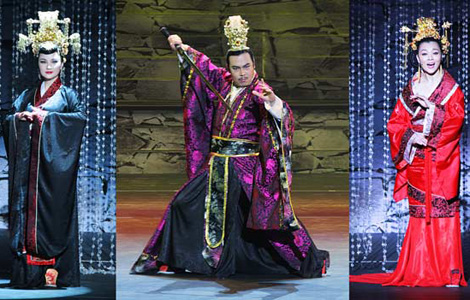Officials take to global stage as China's influence grows
Updated: 2013-11-19 07:59
By Zhang Fan and Zhao Yanrong (China Daily)
|
||||||||
More Chinese taking leading positions at international organizations will bring China's expertise to global development and enhance the country's reputation in world affairs, observers said.
Zhao Baige, vice-president of the Chinese Red Cross, was elected vice-president of the International Federation of the Red Cross and Red Crescent Societies on Wednesday.
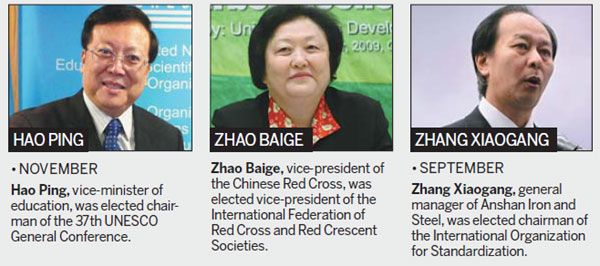 |
|
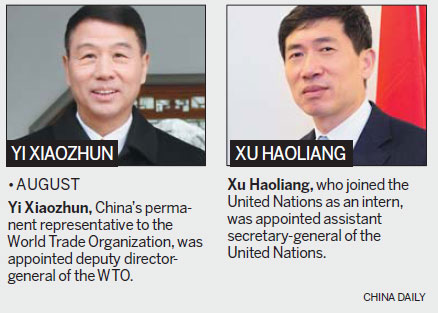 |
Two weeks ago, Hao Ping, China's vice-minister for education and representative to the UNESCO executive board, was elected chairman of the 37th General Conference of the United Nations Educational, Scientific and Cultural Organization for a two-year term.
In addition, four other Chinese officials also took charge of various international organizations this year.
China's Vice-Minister of Finance Li Yong became director-general of the United Nations Industrial Development Organization in June. Yi Xiaozhun, China's permanent representative to the World Trade Organization, was appointed as deputy director-general of the WTO in August. And Zhang Xiaogang, general manager of Anshan Iron and Steel, became president of the International Organization for Standardization in September.
In August, Xu Haoliang, who joined the United Nations as an intern, was appointed assistant secretary-general of the United Nations.
From 2003 to 2013, a total of 15 Chinese officials gained leading positions at international organizations.
Zhou Xinyu, a researcher at Beijing Foreign Studies University, said the growing number of Chinese taking senior positions at international agencies is a result of China's growing strength and global influence.
"The world is looking forward to China's voice in international affairs and also trusts China as a responsible state facing global challenges," Zhou said.
He said China is becoming a major power and the world needs China's participation in solving international issues.
"It has also resulted from China's social development. China's society is now closely connected with the world, Chinese are getting more familiar with international mechanisms and rules and are more competitive in personal skills," he added.
As the largest developing economy, China's involvement in the international community will also benefit all developing countries, said Dong Manyuan, deputy director of the China Institute of International Studies.
"China will seek more rights for developing states, especially the equal right of development. China will protect Third World countries through its enlarging international influence," he said.
Reviewing the profiles of these Chinese officials, it is not difficult to find their common advantages: a good educational background, years of work experience and skills in communicating with international organizations.
Wu Jianmin, vice-chairman of the China Institute for Innovation and Development Strategy, said these Chinese officials will bring their experience and culture, such as the pursuit of balance and harmony, into their respective organizations.
Wu, former Chinese ambassador to France, became honorary president of the International Exhibitions Bureau in 2003. He is also the first person from a developing economy to hold the position.
China surpassed Japan as the world's second-largest economy in 2010. China's experience in economic development is considered valuable to other economies.
But according to a recent report released by the United Nations, as of the end of June, there were only 74 Chinese working in the United Nations Secretariat, making China one of the underrepresented countries.
Wang Yizhou, deputy dean of the School of International Studies at Peking University, said although more Chinese are taking key positions at international organizations, China's participation still lags behind western countries and even India and the Republic of Korea.
"It's a great honor for China to have its citizens undertaking important responsibilities at international organizations, but it's only a start. China did make progress in participating in global governance, but there is still a lot to be done."
As the sixth-largest United Nations contributor, China will play a more important role in global governance, Wang said.
"It's both an opportunity and a challenge for us."
Contact the writers at zhangfan1@chinadaily.com.cn and zhaoyanrong@chinadaily.com.cn
- At least 29 killed in train collision in Egypt
- Kerry to visit Israel to discuss Iran deal
- 100 killed in tribal clashes in Sudan
- Commonwealth urges for inclusive growth
- Hot air balloons take off at Int'l Balloon Festival
- 5 foreigners, including 3 Chinese, missing in furnace blast in E. India: official
 NASA launches robotic explorer to Mars
NASA launches robotic explorer to Mars
 Survivors of Midwest tornado sift through wreckage
Survivors of Midwest tornado sift through wreckage
 Chinese manufacturers feel their way in African market
Chinese manufacturers feel their way in African market
 Change in energy mix encouraging
Change in energy mix encouraging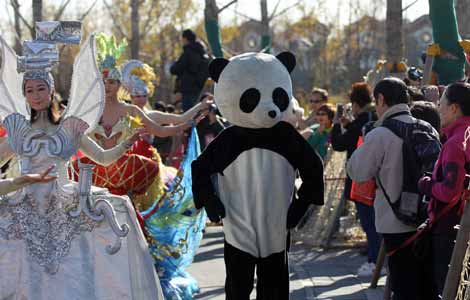
 Floral farewell to Garden Expo
Floral farewell to Garden Expo
 Nation braces for more babies
Nation braces for more babies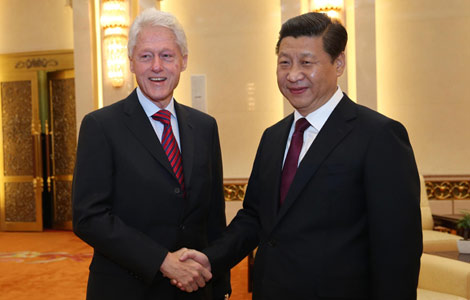
 Xi Jinping meets former US president Clinton
Xi Jinping meets former US president Clinton
 5 dead as tornadoes ravage US Midwest
5 dead as tornadoes ravage US Midwest
Most Viewed
Editor's Picks

|

|

|

|

|

|
Today's Top News
Officials take to global stage as China's influence grows
Alipay streamlines travel
NASA launches robotic explorer to Mars
China increases US debt holdings
China in midst of refinery boom
China eyes green plan for 2030
Survivors of US tornado sift through wreckage
Xi thanks Clinton for furthering ties
US Weekly

|

|

